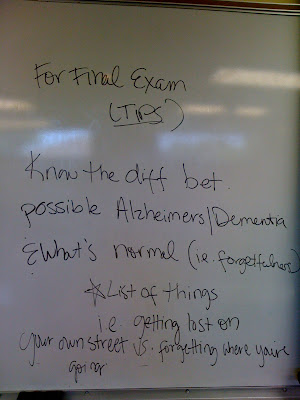Tuesday, May 11, 2010
Commitment/ Marriage/ Living Together Slides in BB
They should help you summarize "what you know" about the topic ;)
Vaccines Given in Childhood
You don't need to know all of these, but I want you to be familiar with all of the protections we get for our children in current day that were not available before (to address the intervention theme for an essay question). It is the reason many of us are still here, or not suffering from one of these diseases.
***Hepatitis B and two or three others are now required before preschool entry in the Fall in the State of TN (we just got the letter).****
Hepatitis B vaccine:
1.First dose at birth to 2 months
2.Second dose at 1 to 4 months
3.Third dose at 6 to 18 months
Hib vaccine(HIB), a bacteria responsible for a range of serious "invasive" diseases including meningitis with potential brain damage and epiglottitis with airway obstruction.
More than 90% of all HIB infections occur in children 5 years of age or less; the peak attack rate is at 6-12 months of age.
:
1.First dose at 2 months
2.Second dose at 4 months
3.Third dose at 6 months
4.Fourth dose at 12 to 15 months
Polio vaccine (an acute viral disease marked by inflammation of nerve cells, causes paralysis) of the brain stem and spinal cord :
1.First dose at 2 months
2.Second dose at 4 months
3.Third dose at 6 to 18 months
4.Fourth dose at 4 to 6 years
DTaP ( diphtheria, tetanus, and pertussis) vaccine:
1.First dose at 2 months
2.Second dose at 4 months
3.Third dose at 6 months
4.Fourth dose at 15 to 18 months
5.Fifth dose at 4 to 6 years
6.DTaP is recommended at 11 years
Pneumococcal vaccine:
1.First dose at 2 months
2.Second dose at 4 months
3.Third dose at 6 months
4.Fourth dose at 12 to 18 months
Rotavirus vaccine:
1.First dose at 2 months
2.Second dose at 4 months
3.Third dose at 6 months
Hepatitis A vaccine:
1.First dose at 12 months
2.Second dose at 18 months
Influenza vaccine:
1.First dose at 6 months (requires a booster one month after initial vaccine)
2.Annually until 5 years (then yearly if indicated or desired, according to risks)
MMR vaccine (Three in one: Measles, Mumps and Rubella):
1.First dose at 12 to 15 months
2.Second dose at 4 to 6 years
Varicella vaccine:
1.First dose at 12 to 15 months
2.Second dose at 4 to 6 years
Meningococcal ( severe bacterial infection of the bloodstream or meninges (a thin lining covering the brain and spinal cord) vaccine:
1.Single dose at 11 years
Human papillomavirus vaccine (adolescent girls only):
1.First dose at 11 years
2.Second dose two months after first dose
3.Third dose six months after first dose
http://www.medicinenet.com/childhood_vaccination_schedule/page2.htm
***Hepatitis B and two or three others are now required before preschool entry in the Fall in the State of TN (we just got the letter).****
STDs/ STIs
Which STI/STDs are bacteria vs. virus (curable vs. non).
Which can you transmit without having sexual intercourse or oral sex?
Which can you transmit without having sexual intercourse or oral sex?
Freebie
24. One reason why men may resort to stonewalling when conflict occurs in a relationship is:
a. Men lack the skills to effectively communicate their feelings.
b. Men get physiologically more upset than women and stay upset longer.
c. Men are less emotional than women
d. Men require more time to process emotional responses.
a. Men lack the skills to effectively communicate their feelings.
b. Men get physiologically more upset than women and stay upset longer.
c. Men are less emotional than women
d. Men require more time to process emotional responses.
Violence
Rape and who is the most likely perp?
Who commits the most homicides?
Who is the most likely to commit suicide?
Who commits the most homicides?
Who is the most likely to commit suicide?
Sunday, May 9, 2010
Wednesday, May 5, 2010
Monday, May 3, 2010
Subscribe to:
Comments (Atom)




